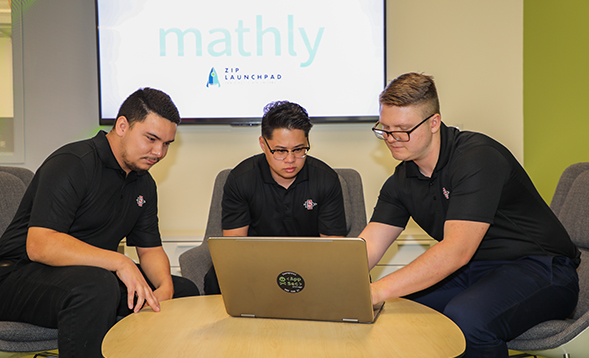Want to Be an Entrepreneur? Here's How to Get into ZIP Launchpad
Applications are now open for the spring semester to be mentored by experts at the business incubator.

When you walk into the Zahn Innovation Platform (ZIP) Launchpad in the Engineering and Interdisciplinary Sciences Complex, the open, ultra-modern co-working space exhibits a creative vibe. Snippets of conversation remind you it’s a thriving incubator for aspiring entrepreneurs to vet their ideas and fine-tune their plans for start-ups.
“What is your target market? You’re looking at low-income, middle class and affluent families,” Cathy Pucher, executive director of the ZIP Launchpad and chief ”den mother” asks a team of students reporting on their progress. “You need to focus on one segment of the market. The affluent have many choices, so the middle-income might be a potential target.”
The student team meeting with her that afternoon are computer science majors, working on shaping their idea for an app to make math learning fun, engaging and rewarding for middle and high school students.
The Mathly team met at Southwestern College in Chula Vista, became friends and began discussing their hopes to launch a tech start-up even before they transferred to San Diego State University. They were among 76 teams of potential entrepreneurs that applied in August to be part of the fall 2019 cohort at ZIP Launchpad. A total of 13 teams proved they had a solid idea and made the cut, getting into the first phase – E-Track – where they work on better understanding their target market and honing their idea.
“We all have a background in tutoring math. I tutored my sister who isn’t very interested in it, and I found it’s very hard to get someone hooked on learning math,” said Rainier Dirawatun, a senior. “So that’s how our idea came about.”
Help polishing applications
The application window for the spring 2020 cohort is open through Feb. 9, 2020.
Like many others mentored at ZIP Launchpad, the Mathly team heard about the opportunity when one of the center’s staff members visited their class. They have been in the program for two months now, but they first went to an application workshop and office hours at the center before they submitted their application.
Pucher said more of those who take advantage of the pre-application resources tend to succeed in getting in, because they learn how to put together a convincing business proposal that describes a real-world problem, and how to solve it.
What stood out about the Mathly team was that they had personal experience with math tutoring, Pucher said. “Many of them have struggled to tutor their siblings and others. I liked that they identified early on…that they wanted to develop a company.”
Finding the sweet spot
The business proposals don’t have to be groundbreaking. In the case of Mathly, school students do have access to Khan Academy and other online resources to improve their math learning skills. But the gap in the market the team aims to fill is very specific.
“Mathly solves the root problem of kids not being interested in math, who also don’t have the economic means for tuition,” Dirawatun said.
Robert Carpenter, another team member and a junior, explained how Mathly would be different from currently available online resources.
“I’ve gone to Khan Academy to figure out trigonometry for example, but it wasn’t out of a driving passion to learn, more because I had to master it,” Carpenter said. “Mathly will have a user-friendly interface that engages and rewards students with positive reinforcement.”
The team is doing grassroots research at area schools, asking parents what challenges they face and what incentives they would be willing to offer their children.
Pucher said the team initially considered an allowance as incentive, but then learned not every child is motivated by money as a reward. Many parents also resisted the idea.
“So instead of our original plan for incentives, we’ve created the ‘practice, perform, award’ incentive,” said Jeremy Goold, another teammate and a junior.
Dirawatun, Goold and Carpenter, along with a fourth team member Jamshid Aziz, felt the application process helped flesh out their initial idea. Dirawatun suggested applicants come with a specific problem to solve, not a broad idea.
“You need to have a passion for the problem or you’re not going to put the work in,” Carpenter added.
In December, the team will go in front of a review board to assess progress made and whether they deserve to continue onto the next step in the process, Launch 1, where they work on mock-ups and solution testing.
Typical applicants are juniors and seniors, but Pucher encouraged students to apply as early as freshman year.
“We will meet with them one-on-one, and we suggest they come in to introduce themselves before applying, so they understand what it takes to get into the program,” she said. “It’s free, but it does require a time commitment and a true passion for their idea.”



